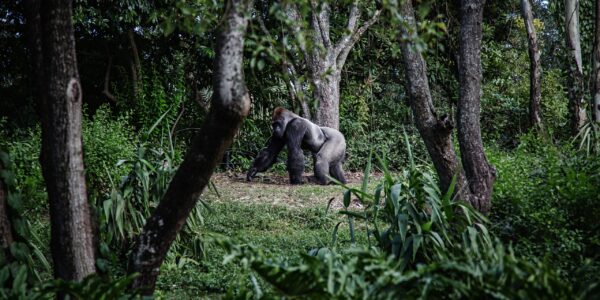Getting a new animal feed product approved for sale in the European Union can be a minefield. In particular, organic feed products require proof they have not been produced by a genetically modified organism (GMO) for approval. It is not so difficult to show that a production strain contains specific DNA fragments in its genome, but troublesome to prove their absence. This is why Trouw Nutrition approached BaseClear: they needed specific guidance on proving the non-GMO status of a strain used to make a vitamin for the organic feed market.
 Trouw Nutrition is a leading global supplier of animal nutrition products and services. They have been collaborating with BaseClear on the submission of a dossier to EU regulatory body EFSA for several vitamins produced by microorganisms. BaseClear’s state-of-the-art analyses and expertise on genomics have been essential in preparing the safety dossier to gain approval to market Trouw’s new feed additives in European markets.
Trouw Nutrition is a leading global supplier of animal nutrition products and services. They have been collaborating with BaseClear on the submission of a dossier to EU regulatory body EFSA for several vitamins produced by microorganisms. BaseClear’s state-of-the-art analyses and expertise on genomics have been essential in preparing the safety dossier to gain approval to market Trouw’s new feed additives in European markets.
GUARANTEEING QUALITY ANIMAL FEED
Animal nutrition plays a pivotal role in the provision of protein foods and dairy to our kitchens. The addition of vitamins, minerals, amino acids and enzymes to animal feed delivers a balanced diet that maximises the health of the animals and their productivity, and protects the environment. Trouw Nutrition is committed to providing high quality and cost-effective animal feed products to livestock farmers worldwide. “Customers expect a safe product. It’s extremely important to guarantee that is really the case” according to Reinder Sijtsma, Director Government Relations and Regulatory Affairs for Nutreco, the parent company of Trouw Nutrition.
All additives for animal feed must undergo a rigorous evaluation process by the European Food Safety Authority (EFSA) as part of the approval process to be marketed and sold in the European Union. This process guarantees the safety and efficacy of the products for humans, animals and the environment. EFSA approval is also a gateway to global markets: once the stringent EFSA approval is gained, other countries can be assured that it is of high quality and is effective.
WHITE BIOTECHNOLOGY AND ANIMAL FEED ADDITIVES
Feed additives can be produced in different ways: mining for minerals, by using chemical synthesis, or biosynthesis by fermentation. There has been a gradual move over the past decades to use white biotechnology – when microorganisms such as fungi, yeasts and bacteria are used on industrial scale – to produce substances such as vitamins, amino acids and enzymes used in feed and food. Significant cost and environmental benefits have resulted from this gradual shift away from chemical processes. Recently in 2018, EFSA adopted additional guidance for feed additive production using microorganisms. The new guidance requires producers of feed additives to obtain a full genomic sequence of the production strain, test the final product for DNA fragments from the production strain, and prove that it does not contain genes for antibiotic resistance or known biological toxins. In addition, products for organic farming must not be produced by a GMO.
THE RIGHT PARTNERSHIP FOR GENOMICS EXPERTISE
When Trouw Nutrition recently needed genomic analysis and interpretation to get a new vitamin product approved for the European market, BaseClear was considered. “We needed both excellent analytical capabilities and knowledge of how genomics interacts with the complex regulatory environment in the EU. When a colleague suggested BaseClear, it soon became clear they could work within our team to actively support dossier preparation” says Hans van den Heuvel, QA manager for Trouw Nutrition.
Trouw Nutrition was looking for evidence that the vitamin product, produced by a microorganism, did not contain residual DNA fragments from the production process. In addition, they wanted to prove that it was not produced by a GMO, did not contain antibiotic resistance genes and was not capable of producing toxins. The non-GMO status was especially important because the product was intended for use in organic farming. Not only was BaseClear able to perform the required analyses, they could interpret the results as well as provide excellent documentation that formed an important annex to the regulatory dossier. BaseClear was an integral part of the Regulatory Affairs team that was fully invested in the end result. They could think along with Trouw Nutrition and challenge their approach.
Adalberto Costessi, Product Manager Genomics & Regulatory Affairs for BaseClear, sees as this collaborative approach as a key strength of projects with BaseClear. “We are seeing an increase in demand for this kind of analysis and interpretation. BaseClear has built up an increasingly strong expertise in microbial genomics, and partners with customers from the initial phase of their project to help decide the best approach to use. We are proud we can support our customers in providing a complete solution for all their genomics needs.”
REACTING TO CHALLENGES – NOW AND IN THE FUTURE
The field of genomics research is in motion. New breakthroughs are increasing the applicability of genomics every day. The regulatory environment is also changing. Customers demand more transparency about how their food is produced or new products are made, and this is reflected in new regulations about production processes. “Innovation is one of our key values, but we also expect it from our service providers. The world is changing very fast. Stay innovative, and stay a leader in the genomics segment” advises Reinder Sijtsma to BaseClear.
Acknowledgement:
BaseClear would like to thank Reinder Sijtsma (Nutreco) and Hans van den Heuvel (Trouw Nutrition) for their contributions to this case study.
REFERENCES
EFSA FEEDAP Panel (EFSA Panel on Additives and Products or Substances used in Animal Feed). Guidance on the characterisation of microorganisms used as feed additives or as production organisms. EFSA Journal 2018;16(3):5206. https://doi.org/10.2903/j.efsa.2018.5206
Regulatory Affairs at BaseClear
BaseClear can help you acquire a safety assessment dossier on microorganisms used as production strains, probiotics, live biotherapeutics, novel foods, feed additive production and fermentation among other food & feed applications.
Read more about our solutions
Related items

 Trouw Nutrition is a leading global supplier of animal nutrition products and services. They have been collaborating with BaseClear on the submission of a dossier to EU regulatory body EFSA for several vitamins produced by microorganisms. BaseClear’s state-of-the-art analyses and expertise on genomics have been essential in preparing the safety dossier to gain approval to market Trouw’s new feed additives in European markets.
Trouw Nutrition is a leading global supplier of animal nutrition products and services. They have been collaborating with BaseClear on the submission of a dossier to EU regulatory body EFSA for several vitamins produced by microorganisms. BaseClear’s state-of-the-art analyses and expertise on genomics have been essential in preparing the safety dossier to gain approval to market Trouw’s new feed additives in European markets.

